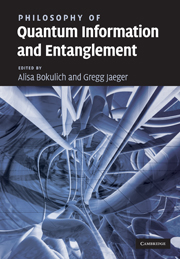Book contents
- Frontmatter
- Contents
- List of contributors
- Preface
- Introduction
- Part I Quantum entanglement and non-locality
- Part II Quantum probability
- Part III Quantum information
- 8 Schumacher information and the philosophy of physics
- 9 From physics to information theory and back
- 10 Information, immaterialism, instrumentalism: Old and new in quantum information
- Part IV Quantum communication and computing
- Index
8 - Schumacher information and the philosophy of physics
from Part III - Quantum information
Published online by Cambridge University Press: 04 August 2010
- Frontmatter
- Contents
- List of contributors
- Preface
- Introduction
- Part I Quantum entanglement and non-locality
- Part II Quantum probability
- Part III Quantum information
- 8 Schumacher information and the philosophy of physics
- 9 From physics to information theory and back
- 10 Information, immaterialism, instrumentalism: Old and new in quantum information
- Part IV Quantum communication and computing
- Index
Summary
Introduction
Many philosophers and physicists have expressed great hope that quantum information theory will help us understand the nature of the quantum world. The general problem is that there is no widespread agreement on what quantum information is. Hence, such pronouncements regarding quantum information theory as the savior of the philosophy of physics are hard to evaluate. Much work has been done producing and evaluating concepts of information.
In I have defended and articulated the Schumacher concept of quantum information. Roughly speaking, quantum information is construed as the statistical behavior associated with the measurement of a quantum system. Hence it is a coarse-grained operational description of quantum systems, with no recourse to the fundamental ontological features of quantum systems responsible for such behavior. From this perspective, construing quantum mechanics as a theory of quantum information departs from the traditional interpretive endeavors of philosophers and physicists. The question is whether there is any motivation for taking such a view.
The theorem of Clifton, Bub, and Halvorson (CBH) provides just such a motivation. The theorem guarantees that, if a theory T satisfies certain conditions, there will exist an empirically equivalent C*-algebraic theory that has a concrete representation in Hilbert space, which it is notoriously difficult to interpret as a constructive or mechanical theory. In such a case, any underlying ontologies philosophers develop that are compatible with T will be undermined by the C*-algebraic equivalent. Bub suggests in light of this in-principle uncertainty regarding ontology that we re-conceive of quantum mechanics as a theory about quantum information.
- Type
- Chapter
- Information
- Philosophy of Quantum Information and Entanglement , pp. 171 - 180Publisher: Cambridge University PressPrint publication year: 2010



